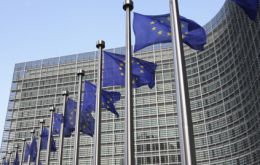MercoPress. South Atlantic News Agency
Tag: Argentine biodisel
-
Thursday, November 8th 2018 - 07:11 UTC
US to review antidumping duties on biodiesel imported from Argentina

The U.S. Commerce Department said it would begin a review of antidumping duties it placed last year on biodiesel imported from Argentina, the Argentine Foreign Ministry said in a statement on Wednesday.
-
Monday, March 27th 2017 - 07:56 UTC
US biodiesel producers want antidumping duties on imports from Argentina

United States biodiesel producers asked the government to impose antidumping duties on imports of biodiesel from Argentina and Indonesia that it says have flooded the US market and violated trade agreements. The move by the National Biodiesel Board (NBB) trade group comes after two years of tension between US and foreign producers over soaring imports that the group says have threatened the profitability of domestic producers.
-
Saturday, October 8th 2016 - 09:59 UTC
WTO confirms ruling in favor of Argentina in biodiesel imports dispute with EU

The World Trade Organization confirmed on appeal on Thursday its ruling partially in favor of Argentina in its dispute with the European Union over duties the bloc imposes on imported biodiesel.
-
Saturday, March 29th 2014 - 05:46 UTC
Argentina takes EU biodiesel antidumping measures to WTO

Argentina formally requested the World Trade Organization's (WTO) Dispute Settlement Body (DSB) the establishment of a panel to address the European Union antidumping measures against Argentine bio-diesel. The initiative was rejected by the EU this week.
-
Friday, December 20th 2013 - 05:57 UTC
Argentina files complaint with WTO against EU duties on bio-diesel

Argentina has filed a complaint with the World Trade Organization against the European Union’s decision to impose anti-dumping duties on its biodiesel exports. The duties are “clearly protectionist” and will affect annual sales worth more than 1.5 billion, Argentina’s Foreign Ministry said on Thursday on its website.
-
Tuesday, October 22nd 2013 - 22:59 UTC
EU imposes punitive duties on biodiesel from Argentina alleging dumping

European Union member states agreed to impose punitive duties on imports of biodiesel from Argentina and Indonesia, which are accused of selling it into the bloc at unfairly low prices, according to diplomats. Argentina has anticipated it will take the case to the World Trade Organization.
-
Friday, October 4th 2013 - 06:45 UTC
European Union considering punitive duties on Argentine bio-diesel

Argentine bio-diesel producers will fight European Union proposals to impose punitive duties on imports from the country, saying the move would remove its biggest export market and raise prices in Europe.
-
Tuesday, May 28th 2013 - 21:52 UTC
EU imposes duties on Argentine biodiesel

The European Union is imposing punitive duties on imports of biodiesel from Argentina and Indonesia, charging them with selling the product into the bloc at unfairly low prices, setting provisional tariffs ranging from 6.8 to 10.6 % for imports from Argentina and between zero and 9.6 % for those from Indonesia.
-
Saturday, April 21st 2012 - 04:03 UTC
Argentina minimizes impact of Spain’s first retaliatory measures

Argentine President Cristina Fernández minimized Spain’s decision to reduce the bio-diesel imports as a retaliation over the expropriation of YPF and called for “calm” after assuring that Argentina “is in condition to absorb” that production in the domestic market.
